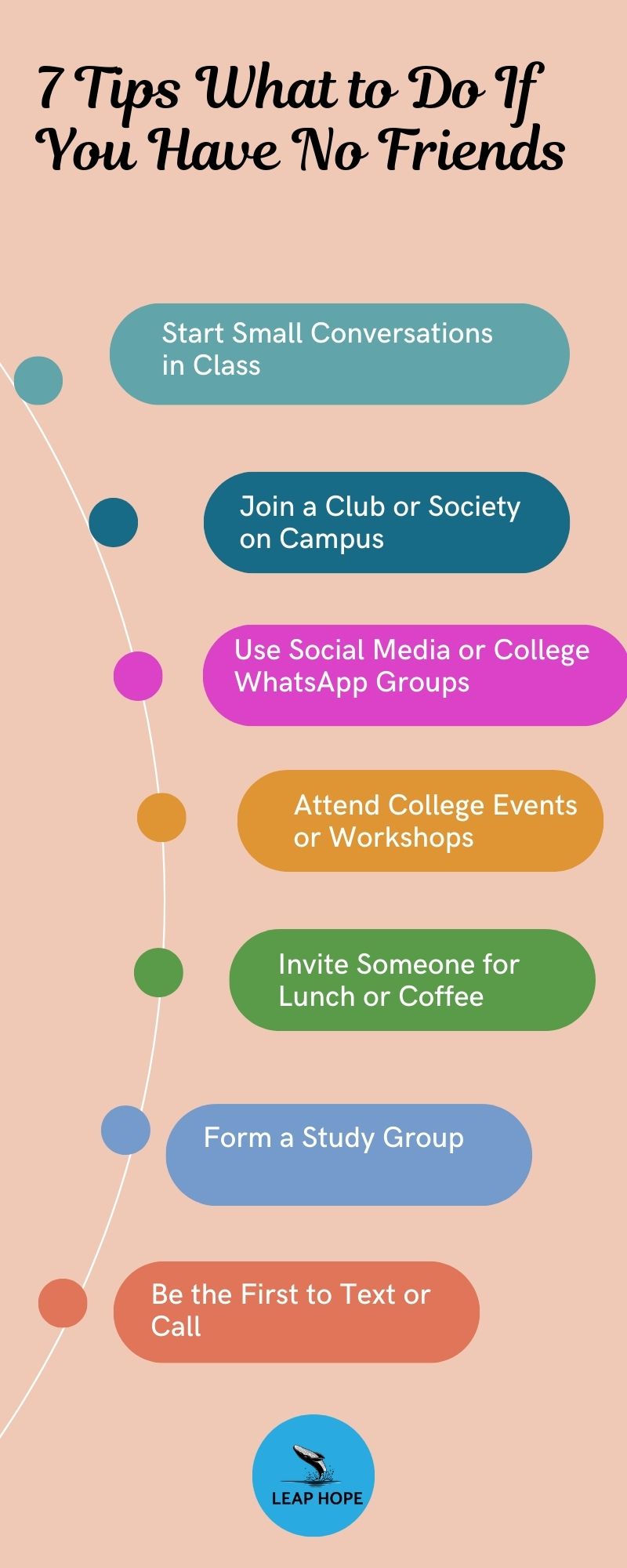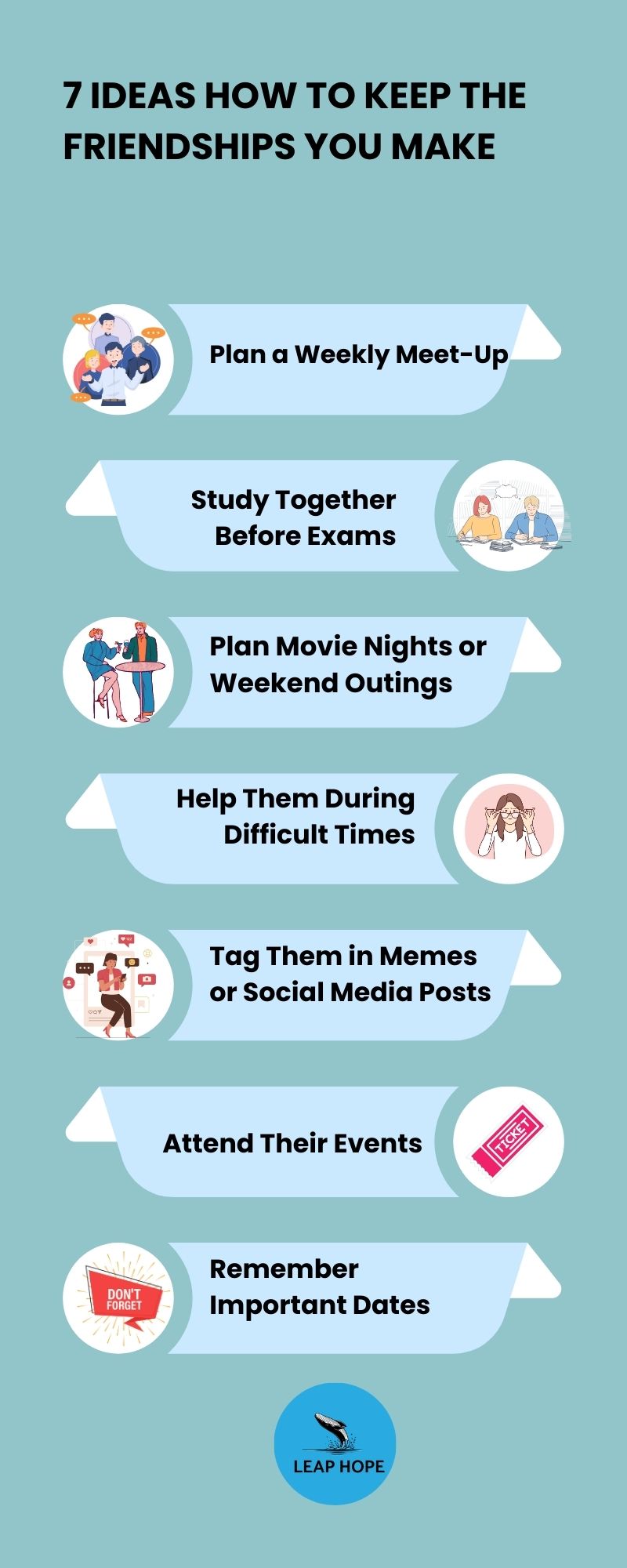Updated: September 2025
Starting college can feel strange when friendships don’t fall into place the way you expected. You’re surrounded by people every day, yet still end up eating alone, walking to class alone, or scrolling through social media, wondering how everyone else seems to have found their group so easily.
What makes it harder is the quiet pressure to believe something is wrong with you. College is often described as the easiest time to make friends, so when it doesn’t happen, self-doubt creeps in fast. You start questioning your personality, your confidence, or whether you missed some invisible rule everyone else understood.
This article breaks down why not having friends in college is more common than it looks, what situations are part of the adjustment phase, and what actually helps you build connections without forcing yourself to become someone you’re not.
Why You Don’t Have Friends in College (The Parts No One Says Out Loud)

Starting college is exciting, but making friends can be challenging for various reasons. Let’s explore some common reasons:
1. You’re Waiting to Be Chosen
A lot of people enter college subconsciously waiting for friendships to “pick” them. You show up, sit in class, attend events, and hope someone takes an interest first.
College doesn’t work that way. Social momentum usually goes to the people who initiate, even if they’re awkward, even if they’re unsure. Waiting quietly often reads as disinterest, not depth.
2. You Leave Before Anything Has a Chance to Form
Friendships rarely start during lectures. They form in the gaps, after class, between activities, during pointless waiting time.
If you arrive late, leave immediately, or retreat into your phone, you’re removing yourself from the exact moments where familiarity builds. No one notices the absence at first, but over time, you simply stop being part of the social picture.
3. You’re Polite, But You’re Guarded
You might be friendly, agreeable, and easy to talk to, yet emotionally distant. You answer questions but don’t reveal much. You listen but don’t lean in.
People don’t bond over politeness. They bond over small disclosures, shared annoyances, and moments of slight vulnerability. If you keep everything safe, conversations stay shallow and end there.
4. You Assume Everyone Else Is Closer Than They Are
From the outside, college friendships look solid. Groups laugh loudly, post photos, sit together every day.
What you don’t see is how many of those connections are temporary, surface-level, or already drifting. But if you believe everyone else has it figured out, you’re less likely to insert yourself and that belief becomes self-fulfilling.
5. You’re Afraid of Looking Desperate
There’s a quiet fear many students carry: “If I try too hard, I’ll look needy.”
So you don’t text first. You don’t suggest plans. You wait for invitations that never come. The irony is that most friendships exist because someone was willing to risk looking a little eager.
Avoiding rejection feels safer, but it also keeps you invisible.
6. You Want the Result Without the Awkward Middle
Everyone wants close friends. Very few people want the uncomfortable phase that comes before them, the forced conversations, the uneven effort, the moments where you’re not sure if the interest is mutual.
College friendships are rarely smooth at the start. They feel clumsy, inconsistent, and uncertain. If you interpret that phase as failure, you’ll quit too early.
7. You’ve Been Quietly Hurt Before
Sometimes the issue isn’t college at all. It’s earlier experiences, being excluded, ignored, or dropped by friends in the past.
That kind of history teaches you to stay guarded. You tell yourself you’re independent, low-maintenance, fine on your own. But part of you is avoiding another disappointment, even if it means staying lonely longer.
8. You’re Comparing Your Inside to Everyone Else’s Outside
You see other students laughing and assume they feel connected. You feel unsure and assume that means you’re failing.
But you’re comparing your private doubts to their public moments. That comparison almost always makes you feel behind, even when you’re not.
Why This Matters
Not having friends in college is rarely about being unlikeable or socially “bad.” It’s more often about habits, timing, fear, and misread signals that compound over time.
Nothing here means you’re stuck. But pretending these patterns don’t exist keeps them running in the background.
What Actually Helps When You Have No Friends in College

1. Start Small Conversations in Class
Starting a conversation doesn’t have to be complicated. After class, turn to the person next to you and ask, “Did you understand today’s lecture?” or “Are you working on the same assignment?”
A small conversation like this can easily lead to longer talks and casual hangouts. Once you start approaching people, it will slowly become easier to make friends.
2. Join a Club or Society on Campus
Colleges often have clubs for different activities like music, drama, dance, coding, or photography. Joining a club related to your interest is a great way to meet new people.
For example, if you love sports, joining a sports club can connect you with like-minded individuals. It also gives you a regular opportunity to meet the same people, helping friendships grow naturally.
3. Use Social Media or College WhatsApp Groups
Many colleges have WhatsApp, Telegram, or Facebook groups for students. These groups are often used to share updates, event notifications, and group discussions. You can use this space to connect with classmates. You can send a simple message like “I’m looking for a study partner for the upcoming exams. Anyone interested?” This is an easy way to find someone to study with, which can eventually turn into friendship.
4. Attend College Events or Workshops
Most colleges organize events, workshops, or fests throughout the year. Attending these events can give you a chance to meet students from different classes or departments.
If you attend a music fest, you can easily strike up a conversation by saying, “Which band are you most excited about?” Events create a natural setting to connect with others without pressure.
5. Invite Someone for Lunch or Coffee
If you’ve had small talks with someone, take the next step by inviting them for lunch, coffee, or a quick snack after class. This will help strengthen the bond and make them comfortable around you.
For example, after a class, you can casually say, “I’m heading to the canteen, do you wanna join?” Even if they decline the first time, don’t feel discouraged. Keep the connection going until it feels natural.
6. Form a Study Group
Getting together for a study group is a fun way to connect with classmates. If you’re having a tough time with a subject or getting ready for exams, grab a few friends and hit the books together.
You could say something like, “Wanna join a study group for the next exam?” Not only will it help with your studies, but it’s a great way to hang out and get to know each other better.
7. Be the First to Text or Call
Don’t hesitate to be the first to text or call after meeting someone. If you had a conversation in class, at an event, or while working on a group project, dropping them a message can really help keep that connection alive.
Want to grab a bite after class tomorrow?” Making the first move shows you’re keen on becoming friends, and most people really appreciate that.
Once You Start Making Friends, Here’s What Actually Keeps Them Going

1. Plan a Weekly Meet-Up
Instead of waiting for random meetups, set a fixed day or time each week to hang out. It could be a coffee break, study session, or a lunch meetup. Scheduling time ensures that you don’t drift apart due to busy schedules.
Example: Every Friday after class, plan a quick lunch or group study session. This routine keeps your bond strong without much effort.
2. Study Together Before Exams
When exams approach, stress levels increase, and people often isolate themselves. This is the perfect time to stay connected by forming study groups or revision sessions. Example: Text your friends a week before exams like “Let’s do a group study session for chemistry. It’ll be fun.” This not only helps in studying but also keeps your friendship strong.
3. Plan Movie Nights or Weekend Outings
Don’t just stick to college-related interactions. Plan a movie night, picnic, or weekend outing once a month to spend quality time together. This helps create lasting memories outside of class.
Example: Plan a movie marathon at someone’s place or a short trip to a nearby park or mall. This strengthens the friendship bond beyond academics.
4. Help Them During Difficult Times
If your friend is going through a rough time (like failing an exam, relationship issues, or homesickness), be there for them. Emotional support during hard times deepens friendships.
Example: If your friend is upset after failing a test, say, “Forget about it. Let’s go for a walk or grab a snack. You’ll feel better.” Small support gestures build strong friendships.
5. Tag Them in Memes or Social Media Posts
In the digital world, tagging friends in funny memes, reels, or relatable content keeps the connection alive, especially when you don’t see each other daily.
Example: If you see a funny meme that reminds you of your friend, tag them with “This is so you!”. This keeps the conversation going even during busy days.
6. Attend Their Events
If your friend is performing in a college event, presenting a project, or participating in any activity, show up. Supporting them in their important moments makes the friendship stronger.
Example: If your friend is participating in a singing competition, attend it and cheer for them. Later, you can say, “You were amazing up there!”. This makes them feel valued.
7. Remember Important Dates
Make it a habit to remember their birthdays, special days, or any important event happening in their life. This small act makes them feel appreciated. Example: If your friend has a presentation or interview, send them a text like “Good luck today! You’ll do great.” This thoughtful gesture keeps friendships strong.
Final Thought
Making friends in college can be a bit tough, and that’s totally alright. It might take some time to find your crew, but don’t get discouraged.
Be gentle with yourself, take some risks, and keep putting yourself out there. Start with small steps, say hi to someone in class, join a club, or just invite someone to hang out. Little by little, you’ll build some solid friendships.
Remember, everyone else is figuring things out, too, so don’t hesitate to reach out. The right people will come into your life when you least expect it, you just have to be willing to give it a shot.
For a broader understanding of how loneliness works and why it can show up during major life transitions, you can also read about loneliness on Wikipedia.
FAQs About Why You Might Not Have Friends in College
1. What should I do if it feels like no one wants to be friends with me?
Don’t lose hope! Sometimes, it just takes a little time to find your people. Keep joining clubs, attending events, or simply talking to classmates. Eventually, you’ll find someone who connects with you. Just don’t stop trying.
2. How can I start a conversation with someone new?
Start with something easy like asking about the class, homework, or upcoming events. Simple conversations often lead to friendships.
3. What if I’m too shy to approach someone?
It’s completely okay to feel shy. You don’t have to start with big conversations. Just smile, say hi, or sit near the same group of people regularly. Slowly, you’ll feel comfortable enough to join in.
4. How do I find people who share my interests?
Look for clubs, hobby groups, or campus events that match your interests. You can also check social media groups related to your college. Being around people who enjoy the same things makes it easier to bond.
5. What if I don’t feel like I fit in with anyone?
That’s normal, and it doesn’t mean you won’t find friends. Sometimes, it just takes time to meet the right people. Keep exploring different groups or events, and eventually, you’ll find your circle.
6. What if I’m scared of being rejected?
Rejection happens to everyone, and it doesn’t mean there’s something wrong with you. Keep trying, and don’t take it personally. The right friends will come along; you just have to keep putting yourself out there.




